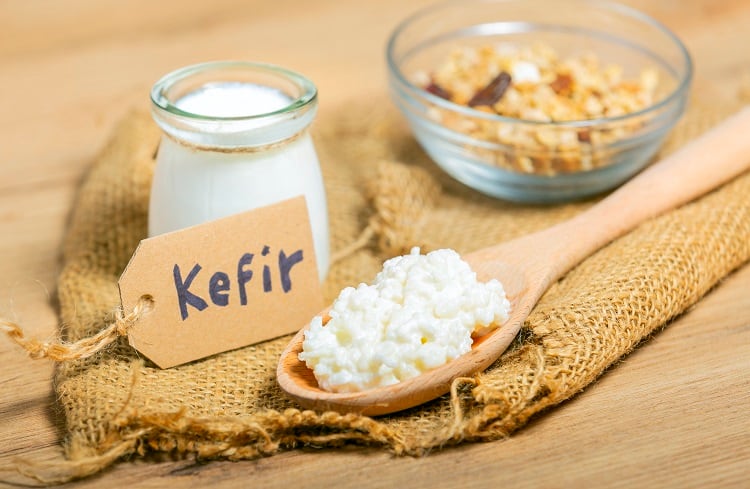Probiotics have already been linked to a whole range of positive health outcomes, including improved mental health, treatment of irritable bowel syndrome (IBS), and a reduced risk of developing cardiovascular disease.
Now researchers have discovered a link between the probiotic, Bifidobacterium, and a reduced risk of developing colorectal cancer.
What are probiotics?
Probiotics are live microorganisms, often described as helpful or ‘good’ bacteria, because they help keep the gut healthy.
Probiotics can be found in foods including live yoghurt, sauerkraut, kimchi and soft cheeses.
The seven main probiotics added to probiotic products are Lactobacillus, Bifidobacterium, Saccharomyces, Streptococcus, Enterococcus, Escherichia, and Bacillus.
Could probiotics cut colorectal cancer risk?
A research team from from Mass General Brigham in the United States discovered the link while attempting to understand how the microbiome contributes to disease development, progression, and response to treatment.
They also sought to determine the risk factors and environmental exposures, contributing to the current rise in early-onset colorectal cancers, and ultimately develop strategies to reduce them.
To conduct their study, the researchers used data from two US-wide prospective cohort studies, known as the Nurses’ Health Study and the Health Professionals Follow-up Study. The studies have documented the diet and lifestyle of more than 100,000 female and 51,000 male health professionals for over thirty years. The researchers also assessed tissue samples for the participants.
The team found 3,079 cases of colorectal cancer within the study group. However, the team only had information regarding the presence of Bifidobacterium in the gut, for 1,121. Of that number, 346 cases (31%) were found to have Bifidobacterium present, while 775 cases (69%) had no Bifidobacterium present.
The team concluded that eating at least two servings of yogurt containing Bifidobacterium, or a food containing the equivalent amount of Bifidobacterium, per week, was associated with a reduced risk of developing proximal colorectal cancer (also known as right-sided colon cancer).
“It has long been believed that yogurt and other fermented milk products are beneficial for gastrointestinal health,” says Dr Tomotaka Ugai, co-senior author on the study. “Our new findings suggest that this protective effect may be specific for Bifidobacterium-positive tumours.”
The researchers hypothesise that long-term yogurt intake could reduce the risk of developing proximal colon cancer by changing the gut microbiome, including Bifidobacterium. But they note that further research, which brings science and population health studies together, is needed to draw a definitive conclusion.
“This paper adds to the growing evidence that illustrates the connection between diet, the gut microbiome, and risk of colorectal cancer,” says Dr Andrew T Chan, co-author on the study. “It provides an additional avenue for us to investigate the specific role of these factors in the risk of colorectal cancer among young people.”

Foods rich in Bifidobacterium
Bifidobacterium are found in fermented foods, including:
- Kefir
- Sourdough bread
- Sauerkraut
- Kimchi
- Live yogurt
- Buttermilk
- Tempeh
- Miso
- Pickles.
- Cured meats
- Some wines
- Some vinegars
What opportunities does this create for food and beverage?
This research is yet another major boost for the gut health industry, which already holds a significant market value of $51.62bn (Grand View Research).
And it’s clear the gut health trend is here to stay, with probiotic food sales soaring.
In fact, 63% of European consumers said they know what probiotics and probiotic foods are (International Probiotics Association), and nearly three in five US adults say they try to eat foods that encourage a healthy gut (Mintel).
“We live in a time where a simple Google search for ‘probiotics products’ shows over 94 million hits,” says a spokesperson for the International Probiotics Association. “The probiotics market continuously expands with the globalisation of online sales, and probiotics are increasingly popular and widely advertised on the internet.”
So, it’s unsurprising that the global digestive health products market is projected to grow at a CAGR of 8.3% over the next five years (Grand View Research).
And food and beverage manufacturers are rushing to keep pace with the rapid growth, launching everything from gut-friendly drinks to gut-friendly sweets and snacks.
Recent innovations include Dutch ingredients start-up NutriLeads‘ exploration into the gut health potential of carrots, while British start-up Little Inca is developing products to support the gut microbiota of infants with quinoa-based baby foods.
“Over the last ten years the patents and filings related to food and drink with probiotics added to them has just soared,” says Rick Miller, associate director for specialised nutrition at Mintel. “We’ve seen an exponential growth of probiotic infused products.”
What is colorectal cancer?
Colorectal cancer is a type of cancer that affects the colon (large intestine) or rectum. It is one of the most common types of cancer worldwide and can be fatal.
The risk of colorectal cancer increases with age, with most cases affecting people over 50 years of age.
Source: Long-term yogurt intake and colorectal cancer incidence subclassified by Bifidobacterium abundance in tumor
Published online: 12 February 2025
DOI: 10.1080/19490976.2025.2452237
Authors: Satoko Ugai, Li Liu, Keisuke Kosumi et al.





